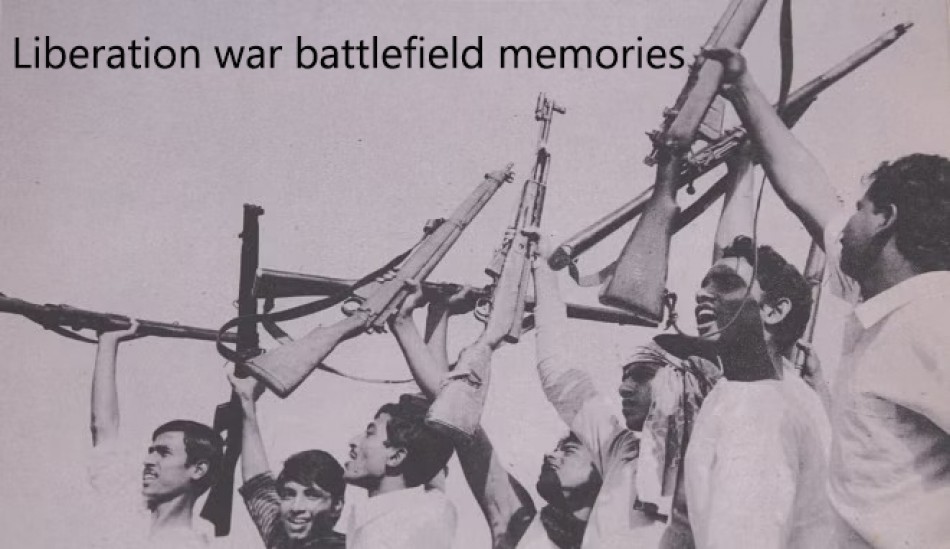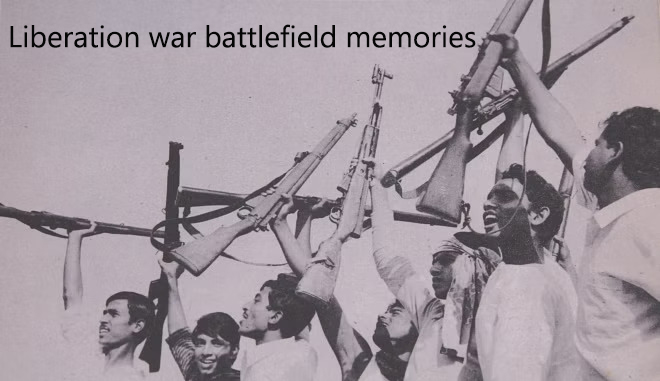Liberation war battlefield memories
I am a young freedom fighter. My name is Debesh Chandra Sanyal. From March 26, 1971 to December 16, the armed great liberation war was fought in our country. On 14th May 1971, a massacre took place in Demra (Bausgari, Rupasi) village of Pabna district with the help of anti-independence forces. Seven hundred men, women and children including my two grandfathers lost their lives in this massacre. With the help of Md. Mahtab Uddin Sarkar of Ponta Zia village, houses and shops of most Hindus including Gaurkundu, PrangopalSaha of Shahjadpur were looted and set on fire. Muslims in our village are very good. Not a single person in our village was against independence. Neighboring Muslims gave us security during the transition of the nation. After learning about the declaration of independence of the father of the nation and the call to take part in the liberation war with whatever one has, I took part in the great liberation war during the transition period of the country. Friday 23 July 1971 (6 Shravan 1378) was the day of departure to take part in guerilla/frontal warfare against Pakistani soldiers and their local allies with training and weapons.At 9 o'clock in the night I left for India to take liberation war training with Mr. Md. Abdur Rahman, then MPA of Shahjadpur. 22 of us left together. The Pakistani invaders planned & quot;Operation Searchlight" after 11-00 PM on March 25, 1971 and started the world 39th worst arson, arson and killings.At that time, most of the places of the whole country were occupied by the Pakistani invaders. On March 27, 1971, the workers of our area from Dhaka and other cities somehow returned t the area. From their mouths, I can hear the worst barbarity against humanity by the Pakistani invaders and their local allies. Most of the Islamic political parties, including the Jamaat-e-Islami of our country, which lost the elections of 70 due to the temptation of Tikka Khan, have joined them.Under the leadership of these countrymen, pitch committee, Razakar Al-Badr, Al-Shams and other forces were formed to support the Pakistani soldiers across the country. All over the country, Pakistani soldiers are committing various anti-human acts including arson, burning, looting, killing, genocide, women torture, rape. The main target of Pakistani soldiers was the Hindus of this country. Pakistani invaders used to ask people to find the Hindus of this country. Malaunkahahai. If a man catches someone, he would say - are you a Muslim? Kalema Batao. Hindus and Muslims were tested naked. Various anti-independence groups are supporting Pakistani soldiers. I will definitely die if I go to the liberation war. Thinking this, the parents would not agree to go to the liberation war. So I left for India without telling my parents and anyone else in the family.Before leaving, I wrote a note to my mother. "Mother, bow down, give my bow to father. Give Pranam to elder Dada, Mezdada, and Boudi. Bless the younger brother and sister. I went to the liberation war. I left without asking you to let me go. Forgive the offense. bless May I return to you victorious. Its your son Debesh.”I did not inform anyone at home when I left. We crossed the border of Bangladesh through Kharijathak village of Chilmari union of Daulatpur police station of Kushtia district and crossed the Padma river through Sujanagar Sat Bariya. We entered India through the Jalangi border in West Bengal, India. MPA Sir arranged for us to be admitted to the Liberation War training and he went to Calcutta for the Provisional Expatriate Government. I was first admitted to Kamarpara Youth Camp. The first training authority did not want to admit me because of my young age. For a few days, I visited various relative's houses in India. I came back to Kamar Para Youth Camp. Special request to admit me. The authorities conducted an interview with me. My country love, brave attitude and other heard. In the initial training camp, only our falling was performed by singing the national anthem and PT parade.After staying at Kamarpara Youth Camp for a few days, I, Rabindra Nath Bagchi, Ratan Kumar Das and Md. Nazrul Islam were transferred to Malanch Camp, then from Malanch to Kurmail Transit Camp. We were brought from Kurmail to Patiram camp. 20/22 people were brought in one batch of Indian Army lorries from Patiram Camp to the Indian Army Training Camp called Panighata in Siliguri Sub-division of Darjeeling District.On the first day of the training, the training coordinator told about the various rules and regulations of the training. Then he said that at 12-00 noon the head of training DS Villon sir will come. At exactly 12-00 noon, Chief of Training Sikh Army DS Villon came.He said to all of us - “... Salute to you. You are brave, you have come to fight to free your motherland from invaders. There is not much we can do for you. We will provide humanitarian aid, training and weapons. You have to make your country independent. I salute your birth parents. They sent their children to the liberation war for the country.Panighata Training Camp was located in Siliguri Sub-Division of Darjeeling District, India. This camp was under Sector 7. Panighata place was surrounded by hills. A wooded area on the south side of a canal coming down from the Karshian Hills. On the left side of the Chan Mari place, the spring water comes down from the hill. They took us to the camp and made us sit in the tent. Each of us was given a mug, a plate, two pairs of pants, 2 genjis, a mosquito net, and bed sheets. Training started. We have 21 days of training. Gave us training in three not three rifles, LMG, SLR, stun gun, twinch mortar, hand grenade charge, use of explosives, first aid etc. Gave ideas on first aid and what to do if a fellow soldier is injured or martyred on the battlefield. A few Indians trained Hindu Bihari and Sikh soldiers. of our company. The chief instructor was Sikh Sena D.S. the villain. I got to know my FF no-4742 from him. After the training, I, Rabindra Nath Bagchi, Md. Nazrul Islam and Ratan Kumar Das were brought to Tarangpur, Kaliaganj Police Station, Sector 7 Headquarters. A guerilla group consisting of 10 people from Tarangpur and Sirajganj district was formed. The group leader of our group is MA Mannan of Tamai village in Bellukuchi upazila.Babu Rabindra Nath Bagchi, a resident of Jamirta village of Shahjadpur upazila, has been appointed as the deputy leader. We were given arms, ammunition, rations and pocket money from Tarangpur. One three not three rifle, one magazine, one helmet issued in my name. Other ammunition, mines, grenades and explosives were given to Commander Sir. There was no guarantee that death would not occur.So I bought a Sri SriChandi book from Tarangpur Bazar to win the war as per Sanatan Dharma tradition, a national flag with a map of Bangladesh to wrap the body in the national flag and float it in the water in case of death and a 4 band radio to listen to news and motivational songs. I took a train from Tarangpur to Kaliaganj by bus. We had to change trains at Siliguri Railway Junction Station. Changed the train and boarded the train to Assam. Indians used to call us the people of Jai Bengal. When he came to ask for a ticket in the government bus and train, if he said ‘Joy Bangla’ he would not ask for a ticket or a fare. We alighted at the station called Dhubri by train bound for Assam. Then I came to Manikar Char by bus. As it was getting late, I stayed at a boarding house in Manikar Char. The next morning I crossed the river and came to the Roumari Muktijoddha training center established in the free area of Kurigram sub-division (now district) of Rangpur district.We had a bath at Roumari camp. Our commander Sir hired a big six-hulled boat to reach Muktanchal Yamuna in Sirajganj district. After having dinner from Roumari Camp, our boat left around 9:00 PM. It was 6 September 1971. Boats have to come through Bahadurabad Ghat, Jagannathganj Ghat and other dangerous areas. We were able to find out. Bahadurabad Ghat is a very dangerous area.The Pakistani soldiers and Razakars of that camp are terrible. They take speed boats to ride the river at night. The freedom fighters were captured by the boat. He was taken to the camp and brutally killed. Our commander Mr. MA Mannan sir ordered –‘All of you stay in position in the bow of the boat. If the Pakistani invaders come to catch us, we will not catch them.I will fight I will fight and be martyred but I will not let them catch me.’ Around 2.00 PM we started crossing Bahadurabad ghat area. We had Chira Gur with us. Early in the morning, the sailors put the boat into a kaisa canal. We went downstairs and peed in the kitchen. I had breakfast with chira and jaggery which we had with us. After that the boat left again. At that time, most of the areas on the way to our river were occupied by Pakistani invaders. Our boat will come in front of Kazipur police station and various dangerous places. The boat arrived after 4 days and reached Sirajganj, the free area of Yamuna. It was near Singhul Char in Tangail district.The boat itself had cooking facilities. The sailors would somehow cook Dalbhat or Khichuri and feed us. I was going without eating like this. The next night I came to the other side of the river Yamuna. I came to the village house of Mr. Abdul MominTalukdar, MNA of Belkuchi-Kamarkhand Constituency. He was not at home then. His brother Md. Rashid Talukdar helped us with accommodation and other matters.Till the middle of October 1971 our commander Sir Rekike did not decide to fight face to face as the number of freedom fighters in our group was less. We used to conduct hit and run guerilla operations to terrorize the Pakistani occupation troops and their allies. I used to come near the Pakistani soldiers or Razakar camp and shoot blank shots of 2/4 three not three rifles in the air. Pakistani brokers, peace committee people and others would know about our assistance. We used to hide in school or someone's house during the day. During the liberation war there were two sides inside the country. A pro-independence. The other is against independence.Members of the Peach Committee against Independence, Razakar, Albadar, Alshams and others. The anti-independence activists used to bring Pakistani soldiers with the information of those who took part in the liberation war, arson, looting, extortion, rape, torture, murder, genocide and other anti-human acts.The owner of the house that sheltered the freedom fighters was captured and tortured and killed. Hindu and Awami League leaders were their big targets. Hindu women used to marry men. Torture, rape and murder. In various places, the freedom fighters also used to kill the especially tyrannical Pakistani brokers and rajakars to leave the side of the Pakistani invaders and not to cooperate with them. Our group motto was – ‘We will not kill any of our countrymen. Explain who will bring them to the side of independence.’That’s why our freedom fighter group did not arrest, torture or kill any anti-freedom. We tried to convince the anti-independence people in favor of independence in various ways by persuading ourselves or through their relatives. Due to our understanding, 5 armed Razakars of Belkuchi Razakar camp escaped with weapons and surrendered to our group through a Razakar of Daulatpur village.Even with weapons in hand we were in constant fear. Any time Pakistani invaders can attack us. The food we had was no guarantee. We used to live in this shelter today and in that shelter tomorrow. I never stayed in any shelter for more than one day. Some days, due to the lack of shelter, I had to sleep on the school bench all night after eating jaggery. There was no question of coating. There were no mosquito nets to protect against mosquitoes.What else is that inhumane suffering? We would take turns at our shelter. Every night commander sir gave us password. After the change of location, the commander sir would sometimes specify where we would assemble if we got separated due to some reason being attacked by the enemy. Usually we didn't stay more than one night in any shelter. I used to change the shelter every night. We used to go to the houses of various rajakars at night and explain them. In the morning we used to full through the guns, clean and oil the guns. At that time most of the people of the country were in favor of independence. However, many did not dare to give us shelter or food due to the fear of anti-independence. Because most of the villages had Pakistani brokers and razakars. They were afraid that if they find out, the neighboring army or Razakar camp will bring them to the camp and burn the house, kill the owner of the house and torture them.Chira Gur was always with us. We took some local Awami League leaders and workers with us for training. My father god and mother god almost went crazy because I went to the liberation war. In order to escape the ultimatum of the Razakars from genocide, the whole family took refuge in Manikar Char refugee camp in Assam, India, risking the loss of everything, leaving all our houses under the supervision of Md. Hussain Ali of the village. Where and before the attack we did Reiki. Then I would attack. Aader Group participated in 3 “Hit and Run” 1 ambush and 3 fierce frontal battles to fight against Pakistani invasion troops and their local allies Razakars. When I died on the battlefield, there was no one to take my body. Our Group Guerrilla/Frontline Wars are:-
1. Belkuchi Thana Attack War: Belkuchi is a notable police station in Sirajganj district. Group Commander Mr. MA Mannan Sir was the leader in this police attack war. On October 24, 1971, I attacked Belkuchi police station and Muslim League leader Md. Abdul Mateen's house with the help of Commander Sir and 3 others. Commander sir briefed in detail at BaniaGati shelter in the evening. He divided us into two groups.It was decided that the large group led by Commander Sir would attack the police station. Another group led by RabindraNathBagchi attacked Matin Sahib's house and captured Matin Sahib. I took part in police raid war from commander sir's group. I started from BaniaGati at 9 pm. I went to the police station and divided into two groups for the target. Decision to attack simultaneously at 12 o'clock in the night. According to the plan, by scrolling along the west side of the police station, he saw the sentry in front of the police station. After blowing the whistle and informing all the police station, they shot at us. Our commander sir commanded and opened fire. We all shot at once. The battle lasted for an hour. Hell mate on the head of the terrible war. Two shots hit the helmet. On my right side is my commander. There are 27 people in our group. There is no way but victory or death. Shooting like rain.The Bihari police and Razakar of the police station escaped through the rear of the police station and boarded a launch in the Sohagpurriver and went into the Yamuna beyond our range. The police station sentry stopped firing and raised both hands and surrendered. We entered the police station. I went inside the police station and saw that 1 policeman and 1 Razaka were shot dead. We took all the ammunition from the police station warehouse. I brought two Razakars of the police station blindfolded and handcuffed.We blindfolded the Rajakars so that they would not recognize our shelter. It was dawn. The party that attacked Matin Sahib's house also came. Mr. Matin has escaped. He could not be caught. People around the police station hoisted Bangladeshi flags on shops and houses. I came away victorious. The next day, hundreds of Paki raiders and Razakars came from Sirajganj and set fire around the police station and tortured people.We captured 2 Razakars in Belkuchi Thana attack. For some time we were kept blindfolded in the shelter. They were kept blindfolded in the next room. I spoke to them with the permission of Commander Sir. I asked them about the background of becoming a Rajakar. After asking them, they seemed to be simple and needy people. They have a wife and son and daughter at home.By believing the words of the Peace Committee people, they became Razakars. They thought it was a job. They have become rajakars to manage the family by earning. They said we did not torture anyone. I did not loot any house. We did not kill any people by bringing Pakistani troops. No house was set on fire. I was enchanted by their words. I opened their eyes.I explained to them in different ways and made a promise - "They will not go back to Razakar". At the time of changing the shelter at night, I had released the two men of Razakar at the request of Commander Sir.
2. BrijPaharrat Razakar camp adjacent to Kalia Haripur railway station and ambush to fight against Pakistani invaders: Kalia Haripur is a railway station in Kamarkhandpolice station of Sirajganj district. This ambush was led by Group Commander Mr. MA Mannan Sir.On November 4, 1971, our group ambushed Razakar Camp near Kalia Haripur railway station on the basis of the reki of Awami League leader Mr. Md. Abdul Hamid Talukder, brother of Mr. Md. Motahar Hossain Talukder, MN, Sirajganj, Jhail village. Commander Sir came crawling and planted electric mines on the rail line. The information was that a train with Paki Hanadar would go to Sirajganj from Ishwardi.Commander Sir planned to blow up the train. Our password this night was rose-jaba. If we get separated while fighting the Pakihanas, we will regroup at Commander Sir's village home, Tamai. We stayed in position in the paddy fields. Mine cable and battery in the hands of commander sir. Paki MilliSheas and Razakars were patrolling with torch lights and hurricanes. Suddenly our mine wire got disconnected due to their feet.The mine caught their eye. The Razakars were told to be ready in the lying position with a whistle. They started shouting torchlight at us and shouting in Urdu. Meanwhile, the train carrying Paki Hanadar arrived from Ishwardi to Sirajganj. The Pak invaders gave the signal. The train stopped at the station. The paki raiders of the train got down with weapons pointed and started looking for us. It was not possible to brush our mine.Considering the number of Pak invaders and other factors, Commander Sir ordered to withdraw. The next day Paki raiders and Rajakars came from Sirajganj and burnt down many houses in Kalia Haripur and tortured many of the villagers. We returned from Rajakar camp ambush near Kalia Haripur railway bridge and assembled at Commander Sir's house in Tamai village. Commander Sir's mother arranged food for us.We had dinner at Commander Sir's house. After eating and drinking, Commander sir briefed us all. A number of locally trained youth were inducted into our group. Taking shelter in such a large platoon is a problem. So Commander Sir Deputy Commander Rabindra nath Bagchi was made another group of 11 of us.
3. Battle of Kalyanpur: Kalyanpur is a village in Belkuchi police station of Sirajganj district. This battle was led by the Deputy commander (designated as Commander) Babu Rabindra Nath Bagchi. Under the command of Rabindra Nath Bagchir, we took refuge in a house in Kalyanpur village of Belkuchi upazila. 5th November '71 The owner of the house arranged for our breakfast. We were tired from walking all night without sleep. After breakfast, I paraded in public. I cleaned the weapon. I shot flowers with weapons. I continued to do duty one by one. Others slept or rested. Kalyanpur is a secluded village. We thought that Paki invaders and Razakars would not come to this village. At around 10 o'clock Ratankumar Das, a fellow soldier on sentry, came running and informed that Shias and Razakars were coming from Belkuchithana with some Paki raiders to catch us.Coming towards Kalyanpur through Bowra village. Two Pakistani agents covered their faces with towels and were guiding the raiders and raiders. From afar it is estimated that there are 5 Militias and 8 Razakars in this group. Our commander decided to fight. At Kalyanpur we took up position in a bamboo thicket like a bunker by the roadside. They were coming along the road that passed in front of the bamboo grove. As soon as we came within our range, our commander Rabindranath Bagchi commanded and opened fire. In one leap the invaders took up positions on the north side of the road. They also fired at us. We also simultaneously started firing like rain. On hearing the gunshots, a group of freedom fighters stationed nearby came forward to help us. The battle continued for more than an hour. Then the Paki invaders retreated with the corpse. 1 Militia and 1 Razaka were killed in this battle. We won the battle and cheered. The confidence of people at all levels was strengthened. I ate and drank in a house and then walked and took shelter in the house of fellow soldier Md. Shamsul Haque of Daulatpur village. I stayed in Daulatpur, Tenashia, Khukni, Bajiarpara, Dargar Char and other villages for a few days.
4. Battle of Dhitpur: Dhitpur is a village in Shahjadpur police station of Sirajganj district. This battle was led by the Deputy Commander (designated as Commander) Babu Rabindra Nath Bagchi. On 23 November ’71 we took shelter in the house of Kala Chakraborty of Syedpur village. On December 13, 1971, I got the news that the Pakistani invaders were fleeing as Kaijuri. The Pakistani invaders were defeated in the battle of Tangail and came to the Malipara camp by boat across the Yamuna river.He took two Razakars with him to mark the road from Malipara camp. We followed them to attack the Pak invaders. they are hungry Kaijuri tried to eat radish from the radish field of a villager. Maybe they didn't know raw radish can't be eaten. Wapda barricaded them and started to advance. We too kept a safe distance and kept walking behind them with our arms raised.They got very angry and went to a place called Dhitpur and they pointed their weapons at us and fired. We jumped and took position on the western side of Wapda barrage. I kept shooting at them. They took position on the eastern side of Wapda dam. The firing and counter-firing continued for an hour. At the sound of gunshots, freedom fighters stationed at different places in Shahjadpur and Beraupazilas came forward to help us. Meanwhile, the evening approached.After dusk the attackers stopped firing. We also stopped shooting in the dark. We were in position all night. Our group was under the command of Babu Rabindra Nath Bagchir. Commander Rabindra Nath Bagchi was driving the LMG on my left. On my right side^ others. At night, shots were coming from Dhitpur Fertilizer warehouse at 2/1 o'clock at times. We were shooting 2/1 in view of their shots.At dawn our commander Barindra nath Bagchi and fence commander Mr. Amir Hossain crawled forward to Dhitpur fertilizer warehouse. He went and found that the Pakistani invaders had fled. Two Razakars kept up covering fire throughout the night. Razakar ordered both to surrender. Razaka's two names were Latif and Kalam. Arms and ammunition were taken from them. It was learned from them that the attackers crawled to a safe distance and fled across the fenced river to reach Dhaka.Later it was learned that the Paki invaders went to Bara Ghat and crossed the river in the boat of Haldars of Bherakola village to Bara police headquarters. From there it left for Dhaka via NagarbariGhat. In the battle of Dhitpur, our comrade Md. Abdul Khalek, Md Amzad hossain of Amir Hussain's group was martyred. Two local pedestrians died on the Wapda barrage during the firing. Having won the battle of Dhitpur, we camped at Jamirta High School.I came to know about the position in the camp - the Rajakars of the KaijuriRajakar camp attacked Beloil village and tortured and shot dead two brothers named Sunil ]and Anil. A few Hindu houses were set on fire and ransacked. For some more of the village the Hindu women tortured the men. Rajakarera killed Hitendra Nam Chand, headmaster of Khukni High School, resident of Puthia village and Manindra Nath Ghosh, resident of Porjana village.Due to personal enmity, RatanKandi grabbed Narayan Chandra Sarkar of Bhairav Para from a crowd of people, tortured and shot him dead. His body was found in the paddy fields of Baziar. Chariya of Ullapara and other places of Sirajganj district were massacred. On December 14, 1971, ShahjadpurUpazilaHandar was liberated. Members of the Peach Committee, Razakar and other freedom fighters fled abroad.Freedom fighter administration was established in Shahjadpur. Mr. Md. Abdul Baki Mirza was appointed as the greatest hero of the freedom fighters of Shahjadpur. Muktijoddha administration bears the running cost of all Muktijoddha camps of Shahjadpur police station including our Jamirta High School Muktijoddha camp. Pakistani invaders surrendered on 16 December 1971.After the surrender of the Pakistani invaders soldiers, under the pressure of the independent Bangladesh government, Bhutan, India, Russia and other governments, the father of the nation was forced to be released from prison on January 8, 1972. The father of the nation came to London in a special plane after being freed from the Pakistani jail. The Father of the Nation was welcomed in London. He arrived in Bangladesh on January 10, 1972 via India in a special flight from London.On January 12, the father of the nation took charge of the country first as the President and then as the Prime Minister after resigning the post of President and introducing the parliamentary democracy system. The Father of the Nation ordered us to lay down our arms.Our group on Sunday 24th January 1972 at Ibrahim Bihari house in Sadar Sirajganj, handed over arms and ammunition to Lt. Saifullah Sir at the temporary arms collection camp and returned to my village home as a brother winner.A national militia camp was set up to rehabilitate freedom fighters from the government. I did not join the militia. After few days Sirajganj SDO office gave me a certificate signed by MuktiBahini Chief Colonel (retired) M.A.G Osmani, a white blanket and arrears of ration and pocket allowance of 110Taka.I came home from my RatanKandi Lower Secondary School head teacher Babu Devendra Nath Sanyal Mahashay and started studying in Shahjadpur Pilot High School in Shahjadpur Pilot High School in class 9 with TC of class 8 autopass.
Liberation war battlefield memories ||Debesh Chandra Sanyal
He is a Freedom fighter and retired banker of Bangladesh.Son of Late Dijendra Nath Sanyal.Mother Name: Late Nilima Rani Sanyal, Village & Post Office: Ratan kandi, Union:Habiullah Nagar, Upazilla: Shahzadpur, District: Sirajgonj Bangladesh. F.FNational List Number Shahjadpur : 104. Lal Barta Release Number: 0312040006, Gazette Number: Non-Military Sirajganj:1679. Indian Training : FF No : 4742. Integrated list district-wise: 1411, upazila-wise: 151 freedom fighter contact management information system, digital certificate and identity card number: 01880001411.






